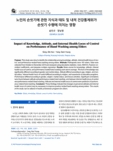

-
 * 본 문서는 배포용으로 복사 및 편집이 불가합니다.
* 본 문서는 배포용으로 복사 및 편집이 불가합니다.
미리보기
서지정보
· 발행기관 : 노인간호학회
· 수록지 정보 : 노인간호학회지 / 17권 / 3호
· 저자명 : 송민선, 양남영
목차
서 론
연 구 방 법
연 구 결 과
논 의
결 론 및 제 언
REFERENCES초록
영어초록
Purpose: This study was done to identify the relationship among knowledge, attitude, internal health locus of control,
and performance related hand washing among elders. Methods: Participants were 197 elders. Data were
collected from October to December 2014 and analyzed using descriptive statistics, t-test, ANOVA, Pearson correlation
coefficients, and stepwise multiple regression. Results: Mean scores for knowledge, attitude, internal
health locus of control, and performance related hand washing were above average. The level of knowledge was
significantly different according to gender and marital status. Attitude differed according to age, religion, and marital
status. Internal health locus of control differed according to religion, and experience of education programs.
Performance differed according to gender, religion, marital status, and leisure activities. Significant correlations
were found between attitude and performance related hand washing, and between internal health locus of control
and performance related hand washing. Attitude and internal health locus of control were predictors of performance
related hand washing. Conclusion: These findings indicate that changes in perceived attitude and internal
health locus of control may be necessary to improve practice related hand washing among elders. The results
of the study can be utilized in health promotional programs for elders.참고자료
· 없음태그
-
자료후기
-
자주묻는질문의 답변을 확인해 주세요

꼭 알아주세요
-
본 학술논문은 (주)학지사와 각 학회간에 저작권계약이 체결된 것으로 AgentSoft가 제공 하고 있습니다.
본 저작물을 불법적으로 이용시는 법적인 제재가 가해질 수 있습니다. -
해피캠퍼스는 구매자와 판매자 모두가 만족하는 서비스가 되도록 노력하고 있으며, 아래의 4가지 자료환불 조건을 꼭 확인해주시기 바랍니다.
파일오류 중복자료 저작권 없음 설명과 실제 내용 불일치 파일의 다운로드가 제대로 되지 않거나 파일형식에 맞는 프로그램으로 정상 작동하지 않는 경우 다른 자료와 70% 이상 내용이 일치하는 경우 (중복임을 확인할 수 있는 근거 필요함) 인터넷의 다른 사이트, 연구기관, 학교, 서적 등의 자료를 도용한 경우 자료의 설명과 실제 자료의 내용이 일치하지 않는 경우
문서 초안을 생성해주는 EasyAI


